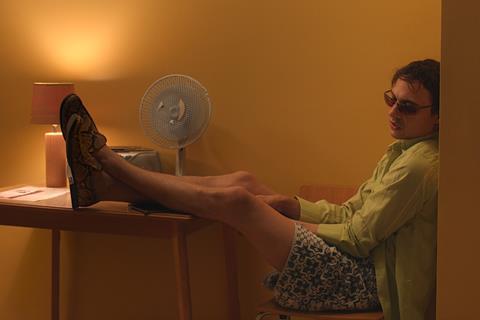British actor-turned-filmmaker bows in Un Certain Regard

Dir/scr: Harris Dickinson. UK. 2025. 99mins
Mike (Frank Dillane), a rough-sleeper in London, is trapped in a spiralling downward cycle of substance abuse. Following a prison sentence, he attempts to turn his life around. And for a while, it seems to be working. He has a bed in a hostel, a job, a collection of self-help cassettes. But certain habits are hard to shake and, for every day sober, there are triggers and temptations waiting to trip him up. It sounds like a punishingly bleak premise, but there’s an unexpected levity and moments of arresting beauty to be found in this distinctive directorial debut from the actor Harris Dickinson (who also appears in the film in a small supporting role).
Boldly creative
It’s an auspicious first feature from Babygirl star Dickinson, who previously made several short films including 2003, about a young soldier’s final day of deployment. It’s also a personal work, rooted in a community he knows first-hand through his volunteer work with homeless charities in North London. With Urchin, he balances a respectful authenticity surrounding addiction and life on the streets with some boldly creative visual devices. This combination elevates the picture – this gritty social realist character study is spiked with striking and unexpected detours, including a brief odyssey down the drain in Mike’s prison shower.
Dickinson’s acting commitments – he is set to play John Lennon in Sam Mendes’ mammoth four-film Beatles project – may mean that we will have to wait a while to see what’s next for him as a writer/director. In the short term, however, Urchin is likely to be a title of considerable interest for distributors and festival programmers following its debut in Un Certain Regard.
While the film should attract interest for Dickinson as a writer and director, it is also a showcase for the considerable acting talents of Dillane, who is tremendous in the central role and rarely off screen. Even at rock bottom – and Mike spends more time than most at rock bottom – there’s a mercurial, magnetic quality to the character. He’s a dandy scarecrow of a man, with hair that sprouts in wild, untamed angles and clothes that hang off his whip-thin, undernourished frame.
While Mike is in the grip of his drug habit, there’s not much more to the character than the overwhelming, savage need for the next fix – addiction has a way of stripping away the meat of a personality until it’s a meagre, depleted wraith. But having shaken the habit during his latest stint in prison, the real Mike emerges into the world, like a blinking, curious creature crawling from a cave after a long hibernation.
There’s something endearingly childlike about Mike, the kind of puckish naivety that you would assume should have been ground down by the hard truths of rough sleeping. “I have an idea for a limousine company,” he says brightly to the stony probation officer who has been assigned to his case. Dickinson’s screenplay astutely refuses to fill in Mike’s backstory – the film, like the character, exists entirely in the present (understandably, Mike finds it easier to blank out the bad decisions in his past).
We learn, from a throwaway comment, that he was adopted; we assume, from a phone call to a weeping woman after his arrest for aggravated robbery, that Mike’s patterns of self-destructive behaviour have driven a wedge between him and his adoptive parents. It seems likely, given Mike’s chipper, almost giddy demeanour following an evening of karaoke with work colleagues (Atomic Kitten’s ’You Can Make Me Whole Again’ is a poignant choice of song) and the emotional crash that follows shortly afterwards, that his mental health issues might include bipolar disorder. But this is not overtly stated. Mike’s rattled, chaotic approach to life is mirrored in the episodic structure of the screenplay, and the deliberately fragmented editing.
Dickinson teases with a glimmer of hope, and the chance of a relationship with Andrea (Megan Northam), a coolly self-sufficient French girl with a converted van and a plan for the future. But there’s an inevitability in the path that the story follows – this is a film about repeated patterns of self-destruction after all. The ending is downbeat, but like much in the film, it is infused with an unexpected beauty.
Production company: Devisio Pictures, Somesuch
International sales: Charades sales@charades.eu
Producer: Scott O’Donnell, Archie Pearch
Cinematography: Josée Deshaies
Editing: Rafael Torres Calderón
Production design: Anna Rhodes
Music: Alan Myson
Main cast: Frank Dillane, Megan Northam, Amr Waked, Karyna Khymchuk, Shonagh Marie, Harris Dickinson
























